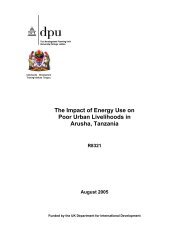EPA Review Annex Documents - DFID
EPA Review Annex Documents - DFID
EPA Review Annex Documents - DFID
Create successful ePaper yourself
Turn your PDF publications into a flip-book with our unique Google optimized e-Paper software.
negotiation positions. The civil servants discuss the negotiation issues and ensure<br />
necessary updates of the different Ministry’s top echelon used for later discussions at the<br />
Federal Executive Council Meetings. The BMOs ensure that the interests of their members<br />
are considered in any decision and insist on technical studies to highlight unclear negotiation<br />
issues.<br />
• The Ministry’s Department of Trade has 211 members of staff on its nominal roll and the <strong>EPA</strong><br />
negotiating team has eight, six of whom have basic degrees in social sciences and business<br />
administration and two who have additional degree in law and one a higher degree in political<br />
science. None have an economics degree. Therefore, a more qualified staff is required to be<br />
involved in the negotiation of the <strong>EPA</strong> either through new employment or through temporary<br />
redistribution of existing staff with training from the Trade Promotion and WTO sections.<br />
• The average salary range of the members of staff of the Intra-Africa unit is between grade<br />
levels 7 and 13. The <strong>EPA</strong> team does not have an external adviser on the <strong>EPA</strong> negotiations,<br />
while it has just four external national consultants who get paid for conducting <strong>EPA</strong>-related<br />
studies through donor funds.<br />
• The Ministry requires a huge budget for negotiations in terms of capacity building,<br />
workshops, carrying out negotiations related studies, travels for actual negotiations and<br />
staying over in Brussels, Geneva or any of the West African countries that <strong>EPA</strong> negotiation<br />
meeting is taking place, but it does not normally have a budget for <strong>EPA</strong> negotiations. The<br />
only year that a N200 million budget was provided for <strong>EPA</strong> negotiation was in 2008 when the<br />
negotiations gathered momentum but only N3 million ($20,000), representing 1.5% of<br />
allocation was realised.<br />
• There are about three capacity-building programmes per officer per year, in the WTO unit,<br />
and most of the capacity building programmes related to this unit are mounted and<br />
sponsored by the WTO while only a few ones are sponsored by the Ministry, representing<br />
about 14.3% per year.<br />
• In the Intra-Africa unit, there are about 0.933 capacity building programmes attended per<br />
officer per year, and in a unit of eight staff, this translates to about eight aid and capacity<br />
programme in all per year for the Intra-Africa unit with sponsorship split equally between the<br />
ECOWAS and the Ministry representing a share of 43.8% each while WTO and EU<br />
sponsorship account for 6.3% each.<br />
• Training applies mostly to the Ministry officials and in few cases to the technical support<br />
team, perhaps because they are perceived as experts in their own right.<br />
Costs<br />
• The number and cost of <strong>EPA</strong> negotiation related meetings attended by government officials<br />
with the EC are those that involve travelling to Brussels to confer with the EC. These are four<br />
in number and are quite few because the negotiations are designed to be undertaken at the<br />
level of the ECOWAS Commission while Nigeria only attends as an observer.<br />
• The ECOWAS Commission is mostly responsible for the passages of the negotiators<br />
including the Nigerian participants.<br />
• The total cost of attending <strong>EPA</strong>-related meetings by the Ministry Officials spent so far during<br />
the period of negotiations between 2006 and 2009 is $56,420.8.<br />
• The negotiators incentives for participating in the negotiations consist of the per diem paid<br />
and the allowances that government pays for travelling usually referred to as daily travel<br />
allowance (DTA). This allowance is not paid for <strong>EPA</strong> meetings since the ECOWAS<br />
Commission will pay per diem rates to the officers.<br />
• The cost calculated is the explicit costs that did not take account of the time that members of<br />
staff spend travelling and the lost hours of work undone at the office during travel. The<br />
143
















